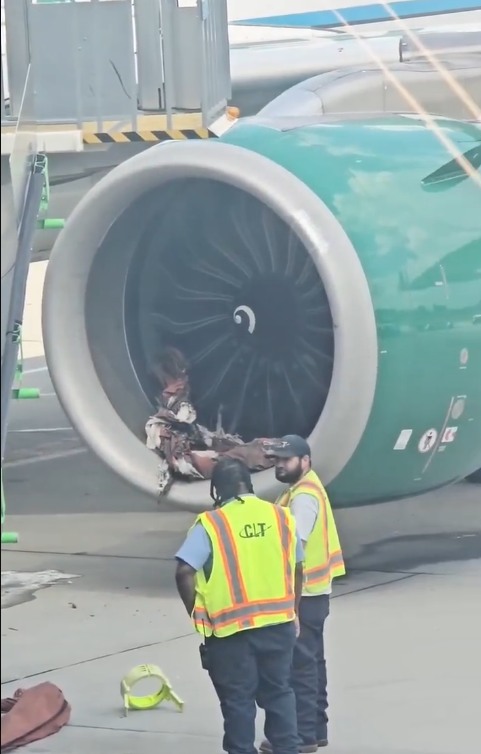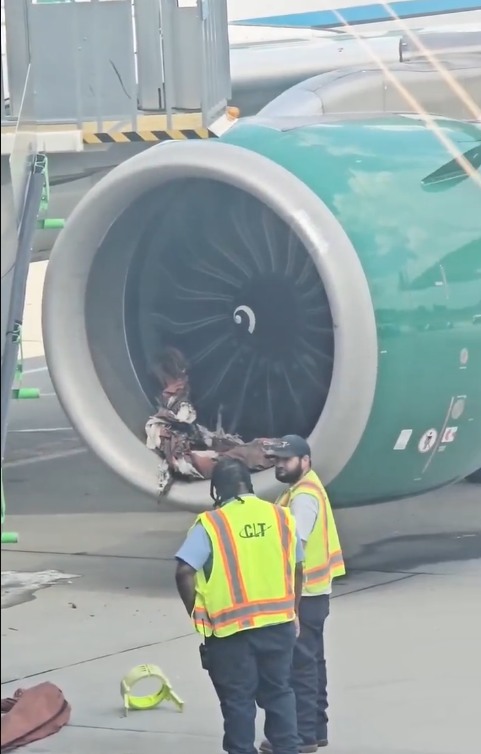Charlotte Douglas International Airport (CLT), one of the busiest aviation hubs in the United States, experienced notable delays on August 16, 2025, following an incident involving a Frontier Airlines Airbus A320neo. While the event caused inconvenience to passengers and operational teams, no injuries occurred, and aviation safety protocols functioned as intended.
This occurrence has drawn attention not only to the specific circumstances of the Frontier Airlines aircraft but also to the broader issues of ground safety, operational coordination, and the way airports handle unexpected challenges.

The Incident in Charlotte
Frontier Airlines Flight F93134 was scheduled to depart from Charlotte to New York–LaGuardia (LGA) on the morning of August 16. The aircraft in use, an Airbus A320neo with registration number N365FR, had already completed a flight earlier in the day from Philadelphia.
As ground crews prepared the aircraft for its next journey, an unusual situation unfolded. A ground-based air-conditioning unit, used to maintain cabin comfort while aircraft engines are shut down, became entangled with the left engine during the pre-departure process. The hose attached to this unit was inadvertently drawn toward the running engine and partially disintegrated, prompting immediate action from airport staff.
Operations were quickly halted. While the passengers onboard were unharmed and crew members followed standard emergency protocols, the aircraft required extensive inspection. Frontier Airlines and its maintenance team decided to remove the aircraft from service until thorough checks and repairs could be completed, in accordance with Federal Aviation Administration (FAA) requirements.
Passenger Experience
For the more than 150 travelers scheduled on Flight F93134, the delay was considerable. Passengers ultimately departed nearly nine hours later after Frontier secured a replacement aircraft.
Though extended waits in terminals can be stressful, most travelers expressed understanding of the airline’s decision. Many passengers acknowledged that aviation safety procedures, even when inconvenient, are designed to protect lives and ensure long-term reliability.
Frontier Airlines provided updates throughout the day, and staff worked to re-accommodate customers as quickly as possible. Some travelers were rebooked on later flights, while others waited for the substitute aircraft. Complimentary refreshments and assistance were offered to help ease the extended layover.
Airline and Airport Response
Frontier Airlines issued a statement shortly after the event, emphasizing its dedication to passenger safety and the integrity of its operations. The company assured the public that while the inconvenience was regrettable, every precaution was being taken to ensure that no risks would remain before returning the aircraft to service.
Charlotte Douglas International Airport, ranked as one of the top ten busiest airports in North America, also reinforced its commitment to safety procedures. Airport officials highlighted that ramp safety—the area around parked aircraft where ground support equipment operates—remains a top priority.
The incident triggered a coordinated response that involved ground crews, maintenance personnel, airport operations, and airline management. Such multi-level cooperation demonstrates how quickly the aviation industry responds to unexpected developments.
Why Ground Safety Matters
While most travelers associate aviation risks with flights themselves, experts note that many safety protocols are designed for ground operations. The area surrounding an aircraft during boarding, fueling, catering, and engine startup is filled with potential hazards.
Equipment such as power units, luggage loaders, catering trucks, and air-conditioning hoses are necessary for passenger comfort and operational efficiency. However, if not carefully managed, these devices can become safety concerns.
In this particular case, the suction power of a modern jet engine is strong enough to pull in lightweight objects within a close radius. Even a minor incident, such as a loose cloth, plastic sheet, or in this situation, a hose, can damage turbine blades and require significant maintenance work.
Aviation authorities such as the FAA in the United States and the International Air Transport Association (IATA) globally maintain comprehensive guidelines to reduce these risks. These include:
- Strict placement rules for ground equipment around parked aircraft.
- Engine startup procedures that require clear communication between pilots and ground staff.
- Regular training sessions to refresh ground crews on ramp safety standards.
Historical Context of Ground Incidents
The Frontier Airlines event is not unprecedented in the aviation world. While uncommon, ground-related issues have been reported at airports globally. Historically, such cases serve as learning opportunities for airlines and regulators alike.
For example, in past decades, airlines introduced stricter ramp markings, advanced communication systems (such as headsets for ground staff), and “safety zones” around engines to minimize accidental equipment contact. Technology has also played a role, with many modern airports investing in automated docking systems and better surveillance of ramp areas.
Passenger Safety vs. Scheduling Pressure
Delays are frustrating for passengers, particularly those traveling for urgent business, family events, or connecting flights. However, aviation professionals consistently stress that safety outweighs punctuality.
By grounding the aircraft and conducting a full inspection, Frontier Airlines prioritized safety, even at the expense of operational efficiency. Industry analysts point out that such decisions, while costly in the short term, protect both passengers and the airline’s reputation in the long run.
Broader Implications for Airports
Charlotte Douglas International Airport manages thousands of daily takeoffs and landings, serving as a major hub for domestic and international flights. With such high traffic, even a single equipment mishap can ripple across schedules, affecting not only the departing flight but also arrivals, gate availability, and connecting operations.
The Frontier Airlines incident highlights the importance of:
- Investing in training – Ground staff must receive continuous training to manage high-pressure environments safely.
- Improving communication – Airlines and airports should ensure that cockpit crews and ground handlers remain in sync before engine startup.
- Updating infrastructure – Airports can benefit from modern equipment with safety features designed to prevent accidental contact.
Industry Expert Commentary
Aviation safety analysts commenting on the incident have described it as a reminder of the need for vigilance rather than a sign of systemic failure.
Dr. Lauren Matthews, an aviation safety consultant, explained:
“What we saw in Charlotte was an example of safety culture working correctly. An unusual event occurred, it was quickly contained, and no one was injured. The fact that delays followed is simply a reflection of how seriously airlines treat even minor risks.”
Another expert, retired pilot Captain David Hernandez, noted:
“For passengers, this shows why patience during delays is essential. The checks being performed are what keep aviation among the safest forms of travel in the world.”
Lessons Learned
The Charlotte incident provides valuable reminders for both industry professionals and passengers:
For Airlines & Airports:
- Continuous vigilance in ramp safety is essential.
- Ground equipment procedures should be reviewed frequently.
- Communication channels between ground crew and pilots must remain clear and unbroken.
For Passengers:
- Delays, while frustrating, are often linked to safety checks that protect travelers.
- Transparency and communication from airlines can help passengers remain informed and calm during disruptions.
Conclusion
The Frontier Airlines aircraft delay at Charlotte Douglas International Airport serves as a case study in the complexities of aviation safety. While the entanglement of a ground hose with an engine was disruptive, it was handled effectively without harm to passengers or crew.
More importantly, the incident underscores the broader truth about air travel: safety is not negotiable. From highly trained ground staff to rigorous FAA oversight, every element of the aviation system is designed to protect lives above all else.
For passengers, the takeaway is clear. While delays can disrupt schedules, they are often the result of protective measures. Air travel remains among the safest transportation methods globally, precisely because the industry responds swiftly and conservatively to even the smallest irregularities.
The Charlotte event may fade from headlines quickly, but its message will remain—aviation is a field where safety comes first, and that is why passengers can continue to trust it.
Beta feature


